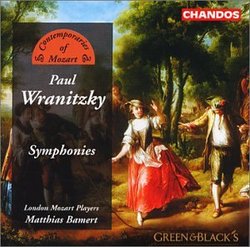| All Artists: Paul Wranitzky, Matthias Bamert, London Mozart Players Title: Paul Wranitzky: Symphonies Members Wishing: 0 Total Copies: 0 Label: Chandos Release Date: 2/26/2002 Genre: Classical Styles: Historical Periods, Classical (c.1770-1830), Symphonies Number of Discs: 1 SwapaCD Credits: 1 UPC: 095115991626 |
Search - Paul Wranitzky, Matthias Bamert, London Mozart Players :: Paul Wranitzky: Symphonies
 | Paul Wranitzky, Matthias Bamert, London Mozart Players Paul Wranitzky: Symphonies Genre: Classical
|
Larger Image |
CD DetailsSimilarly Requested CDs
|
CD Reviews18th Century Masterpieces Robert Kim | USA | 09/04/2004 (5 out of 5 stars) "Paul Wranitzky, born in 1756 (same year as Mozart), was a composer of Bohemian descent. He, like many muscicians of the time, moved to Vienna where he was a part of the bustling musical scene. He was friends with Mozart, and the two composers knew eachother's music. These symphonies, Op. 36, 11, and 31, represent some of the finest examples of the 18th century symphony. Composed in the late 1790s, they exhibit a full and rich command of the classical style, with overtones of the romantic age. They are addictivly melodic, and wonderfully innovating with regards to orchestral textures and part writing. Op. 36 and 11 are for full orchestra, while Op. 31 is scored for strings alone- but what these strings can do! It is a characteristic or programmatic symphony, and finds its premiere recording on this disk. Much credit must be awarded to Bamert for his wonderful "Contemporaries of Mozart Series", of which this is a part. These symphonies are definately on par with Mozart. Very seldom do I come across a Mozart comtemporary like this one. Look out for the music of Paul Wranitzky (not to be confused with Anton Wranitzky, his brother). " A Mighty Fun Revolutionary Medley and Two Genuine Symphonies Gerald Parker | Rouyn-Noranda, QC., Dominion of Canada | 07/11/2007 (4 out of 5 stars) "This compact disc of three of Paul Wranitzky's symphonies, in vigourous and musically shapely performances that conductor Matthias Bamert directs, is one that I had obtained mainly due to its inclusion of a bit of French Revolutionary lore, a fun if leightweight trifle (yet relatively lengthy at 30 1/2 minutes) called "Grand Characteristic Symphony for the Peace of the French Republic" (op. 31). The work is not really a symphony at all in construction, but rather nine pieces linked within four movements which musically depict aspects of the French Revolution, the struggles and a royal tragedy to which it gave rise, concluding with what Wranitzky regards as its peaceful aftermath.
I suspect that the entire work amounts to almost a sort of pot-pourri (medley), for I recognised lots of musical quotes. Those from works by Luigi Cherubini abound in the first movement titled "The Revolution", which is hardly surprising, since Cherubini arguably was the most important and artistically significant of all composers linked closely to the French Revolution. There are quotes of Cherubini's "Médée", from its overture and other passages; since that opera, along with Auber's "La Muette de Portici", was one of the two most flamingly subversive and revolutionary operas ever written, even more so than Verdi's early patriotically-oriented Italain stage works, it hardly surprises that Cherubini's themes are so omni-present in the first movement of Wranitzky's work. When the Austrians are characterised in a couple of other movements, the quotes from music by Joseph Haydn are unmistakable, hardly surprising as composer of the music chosen to represent the Austro-Hungarian Empire as enemy of the Revolution and of Napoleon! I cannot name off-hand the works of Haydn that Wranitzky is quoting, but the themes from Haydn's works sound very familiar. And so it goes. I am a bit surprised that Robin Golding's brochure of notes that comes with the recording did not make some attempt at tracing the sources of music that Wranitzky so obviously, or so it would seem to me, was quoting and paraphrasing for his own compositional use. The two other symphonies by Wranitzky on the CD are much more imposing compositionally, being good, robust works in Classical Era style, finely orchestrated and engagingly melodic, making this recording of the three works all-round a very pleasant release to acquire and to enjoy on repeated hearings." |

 Track Listings (18) - Disc #1
Track Listings (18) - Disc #1







